牛津译林版(2020)选择性必修第一册 Unit 4 Exploring poetry Grammar&Usage 讲解课件(共19张PPT)
文档属性
| 名称 | 牛津译林版(2020)选择性必修第一册 Unit 4 Exploring poetry Grammar&Usage 讲解课件(共19张PPT) |

|
|
| 格式 | pptx | ||
| 文件大小 | 4.0MB | ||
| 资源类型 | 教案 | ||
| 版本资源 | 牛津译林版(2019) | ||
| 科目 | 英语 | ||
| 更新时间 | 2024-09-09 00:00:00 | ||
图片预览

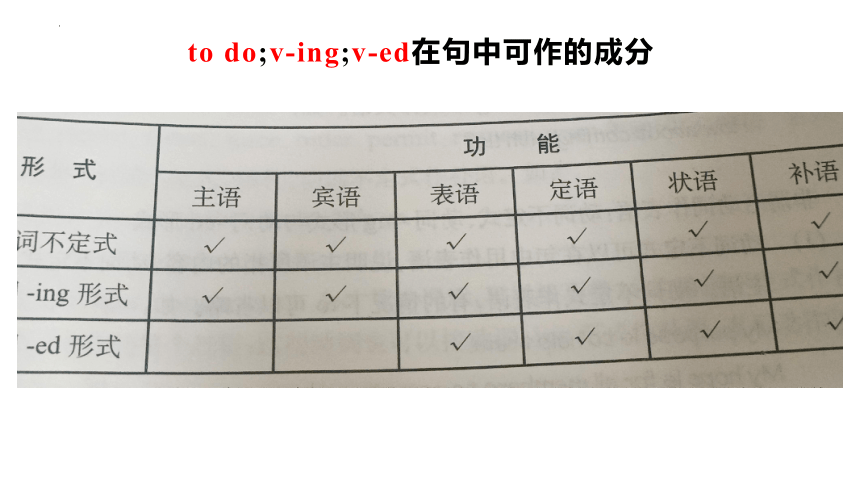
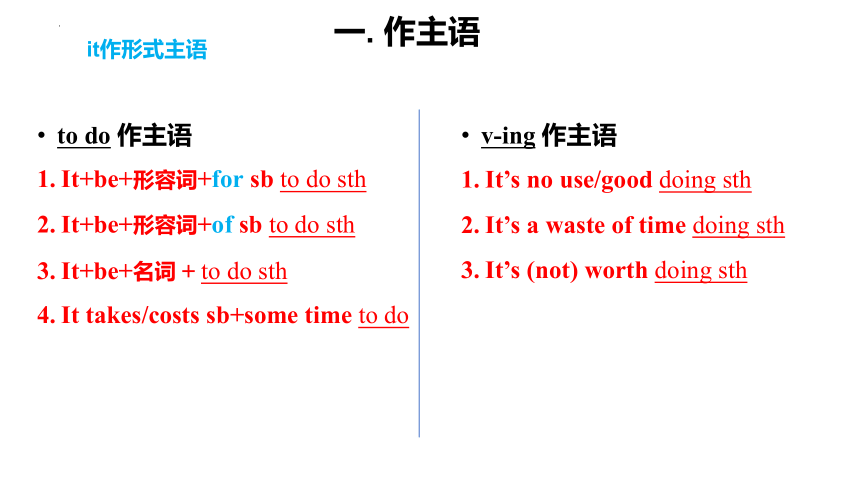
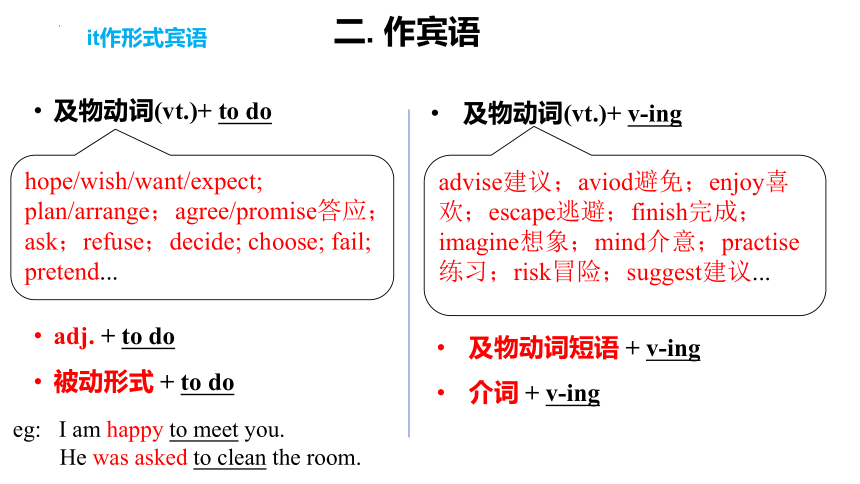
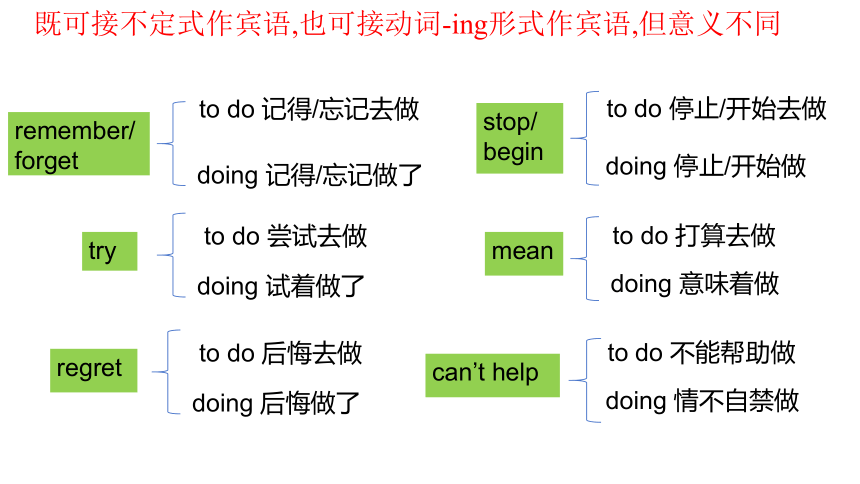

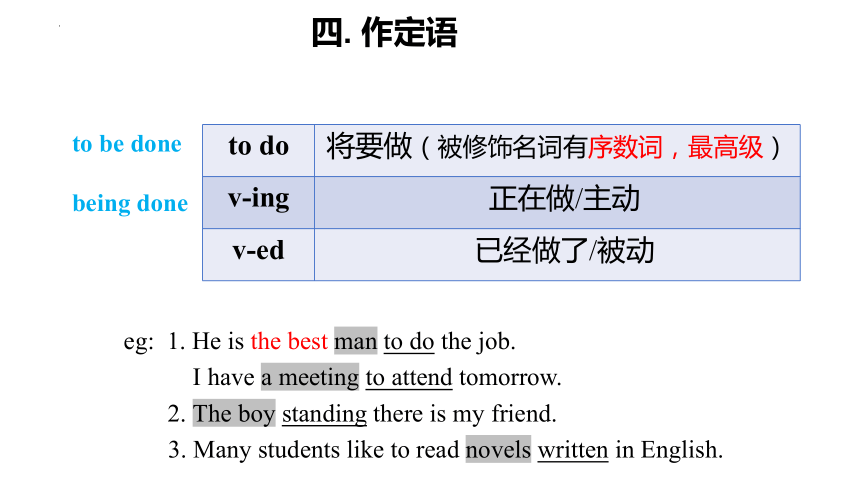
文档简介
(共19张PPT)
Unit4 Grammar
非谓语动词语法归纳总结
to do ; v-ing ; v-ed
to do;v-ing;v-ed在句中可作的成分
一. 作主语
to do 作主语
It+be+形容词+for sb to do sth
It+be+形容词+of sb to do sth
It+be+名词+to do sth
It takes/costs sb+some time to do
v-ing 作主语
It’s no use/good doing sth
It’s a waste of time doing sth
It’s (not) worth doing sth
it作形式主语
二. 作宾语
及物动词(vt.)+ to do
及物动词(vt.)+ v-ing
advise建议;aviod避免;enjoy喜欢;escape逃避;finish完成;imagine想象;mind介意;practise练习;risk冒险;suggest建议...
hope/wish/want/expect;
plan/arrange;agree/promise答应;ask;refuse;decide; choose; fail;
pretend...
adj. + to do
被动形式 + to do
及物动词短语 + v-ing
介词 + v-ing
it作形式宾语
eg: I am happy to meet you.
He was asked to clean the room.
既可接不定式作宾语,也可接动词-ing形式作宾语,但意义不同
remember/
forget
to do 记得/忘记去做
doing 记得/忘记做了
try
to do 尝试去做
doing 试着做了
stop/
begin
to do 停止/开始去做
doing 停止/开始做
mean
to do 打算去做
doing 意味着做
regret
to do 后悔去做
doing 后悔做了
can’t help
to do 不能帮助做
doing 情不自禁做
三. 作表语
to do 说明主语所指的内容
v-ing 主语是物(令人...的)
v-ed 主语是人(感到...的)
四. 作定语
to do 将要做(被修饰名词有序数词,最高级)
v-ing 正在做/主动
v-ed 已经做了/被动
to be done
being done
eg: 1. He is the best man to do the job.
I have a meeting to attend tomorrow.
2. The boy standing there is my friend.
3. Many students like to read novels written in English.
to be done; being done;done作定语的区别
to be done 表示“即将被做”
being done表示“正在被做”
done表示“已经被做”
The meeting to be held tomorrow is of great importance.
The meeting being held now is of great importance.
The meeting held yesterday is of great importance.
五. 作状语
to do 目的 / 结果
v-ing 时间/原因/伴随/结果(主动)
v-ed 时间/原因/伴随(被动)
having done
only to do 竟然...(出乎意料的结果)
so/such ... as to do 如此...以至于
enough + to do 足够...以至于
too ... to do 太...而不能
to do
in order to do
so as to do
eg: 1. He arrived at school, only to find his homework not in his schoolbag.
2. She was in the kitchen, preparing the dinner.
3. Compared with you, we still have a long way to go.
having done 作状语
表示“主动完成”
eg: Having finished their work, they had a good rest.
练习: (struggle) with the problems for hours, Tom finally went to his teacher for help.
Having struggled
六. 作补语
to do expect/forbid/force/order/ask/request+ sb.(宾语)+to do(宾补)
+ sb(宾) + (to) do 动作的全过程
v-ing + sb(宾) + v-ing 动作正在进行
v-ed 被动
see/hear/notice/watch/feel
to do 说明宾语的一个动作的整个过程或结果;
v-ing 说明宾语的动作是主动且正在进行;
v-ed 表示宾语的动作是被动且已经完成。
vt. + sb/sth(宾语) + 补语
非谓语 to do
doing
done
非谓语 to do to be done
doing being done having done
done
非谓语 to do (主动;将来;目的) to be done (被动;将来; 目的)
doing (主动;进行) being done (被动;进行) having done
(主动;完成)
done (被动;完成)
注意:非谓语动词在句子中不充当谓语,可以充当其他任意成分:主,宾, 表, 定, 状, 补
Romanticism was a cultural movement from the late 18th to the mid-19th century. It was a time when many paintersmusiciansnovelists and poets looked at the world in new and different ways.The aim of the Romantics was to break with the ideals of the 18th century: they refused to follow rigid rules; instead they put emphasis on the importance of imagination and feeling,the love of nature and a return to the past.In England the greatest achivements of the Romantic movement lay in poetry,especially that of William WordsworthSamuel Taylor Coleridge,George Gordon Byron and Percy Bysshe Shelley. During that time England was undergoing a process called industrialization. Large factories were being built and people were made to worklong hours. Romantic poets were often not pleased with what was happening in their country and they were not always interested in the improvements in science.Instead they advocated going back to nature. As a result celebrating the beauty of nature and country life became a common theme in Romantic poetryThe poets also wrote about individual feelings and beliefs. Exploring the world of emotion and showing the beauty of nature,the poetry of the Romantic era is one of the greatest treasures in Western literature.
Romanticism was
The aim
;
theme
Definition
Aim
theme
representatives
significance
Romanticism was a cultural movement from the late 18th to the mid-19th century.
It was a time when many painters, musicians, novelists and poets looked at the
world in new and different ways.The aim of the Romantics was to break with
the ideals of the 18th century: they refused to follow rigid rules; instead, they
put emphasis on the importance of imagination and feeling,the love of nature
and a return to the past.In England the greatest achivements of the Romantic
movement lay in poetry,especially that of William WordsworthSamuel Taylor Coleridge,George Gordon Byron and Percy Bysshe Shelley. During that time,
England was undergoing a process called industrialization. Large factories were
being built and people were made to work long hours. Romantic poets were often
not pleased with what was happening in their country and they were not always interested in the improvements in science.Instead they advocated going back
to nature. As a result, celebrating the beauty of nature and country life became a
common theme in Romantic poetry. The poets also wrote about individual feelings
and beliefs. Exploring the world of emotion and showing the beauty of nature,the
poetry of the Romantic era is one of the greatest treasures in Western literature.
Working out the rules
The to-infinitive often refers to an action that will happen in the future; the verb-ing form,a continuing action;and the verb-ed form, a past action. Generally speaking,the verb-ing form expresses a(n)___________________(1)(active/passive) meaning, while the verb-ed form expresses a(n)(2)________________(active/passive) meaning.
The to-infinitive can be used as the(3)_______________of a sentence.
The verb-ing form can be used as the(4)________________of a sentence.
The verb-ed form can be used as the(5)________________of a sentence.
*You can choose more than one answer for each blank.
a subject c object e attributive
b predicative d complement f adverbial
active
passive
a, b, e, c, d, f
a, b, c, d, e, f
b, d, e, f
Born in 1770, William Wordsworth was one of the (1) _________ (lead) poets of the Romantic movement in England. (2) _________ (grow) up in the beautiful Lake District, Wordsworth had a childhood that was perfect for a developing poet. (3) __________ (educate) at Cambridge, Wordsworth received his degree in 1791. He spent a lot of time (4) ________ (tour) in Europe.
leading
Growing
Educated
touring
Travelling obviously provided Wordsworth with plenty of ideas for his poems. In 1795, he met Samuel Taylor Coleridge and the two talented young men became close friends. (5) ________ (meet) Coleridge had a huge impact on Wordsworth. Lyrical Ballads, a collection of poems (6) _______ (write) together with Coleridge, was Wordsworth’s first great work. It was published in 1798 and marked the start of the Romantic era in poetry. Wordsworth explained that they wanted to write poetry that ordinary people could use (7) ___________ (express) their feelings. Many of the poems in the collection were about returning to nature. Like other Romantics, Wordsworth preferred (8) ______________ (live) in the country rather than in the city.
Meeting
written
to express
living/to live
Unit4 Grammar
非谓语动词语法归纳总结
to do ; v-ing ; v-ed
to do;v-ing;v-ed在句中可作的成分
一. 作主语
to do 作主语
It+be+形容词+for sb to do sth
It+be+形容词+of sb to do sth
It+be+名词+to do sth
It takes/costs sb+some time to do
v-ing 作主语
It’s no use/good doing sth
It’s a waste of time doing sth
It’s (not) worth doing sth
it作形式主语
二. 作宾语
及物动词(vt.)+ to do
及物动词(vt.)+ v-ing
advise建议;aviod避免;enjoy喜欢;escape逃避;finish完成;imagine想象;mind介意;practise练习;risk冒险;suggest建议...
hope/wish/want/expect;
plan/arrange;agree/promise答应;ask;refuse;decide; choose; fail;
pretend...
adj. + to do
被动形式 + to do
及物动词短语 + v-ing
介词 + v-ing
it作形式宾语
eg: I am happy to meet you.
He was asked to clean the room.
既可接不定式作宾语,也可接动词-ing形式作宾语,但意义不同
remember/
forget
to do 记得/忘记去做
doing 记得/忘记做了
try
to do 尝试去做
doing 试着做了
stop/
begin
to do 停止/开始去做
doing 停止/开始做
mean
to do 打算去做
doing 意味着做
regret
to do 后悔去做
doing 后悔做了
can’t help
to do 不能帮助做
doing 情不自禁做
三. 作表语
to do 说明主语所指的内容
v-ing 主语是物(令人...的)
v-ed 主语是人(感到...的)
四. 作定语
to do 将要做(被修饰名词有序数词,最高级)
v-ing 正在做/主动
v-ed 已经做了/被动
to be done
being done
eg: 1. He is the best man to do the job.
I have a meeting to attend tomorrow.
2. The boy standing there is my friend.
3. Many students like to read novels written in English.
to be done; being done;done作定语的区别
to be done 表示“即将被做”
being done表示“正在被做”
done表示“已经被做”
The meeting to be held tomorrow is of great importance.
The meeting being held now is of great importance.
The meeting held yesterday is of great importance.
五. 作状语
to do 目的 / 结果
v-ing 时间/原因/伴随/结果(主动)
v-ed 时间/原因/伴随(被动)
having done
only to do 竟然...(出乎意料的结果)
so/such ... as to do 如此...以至于
enough + to do 足够...以至于
too ... to do 太...而不能
to do
in order to do
so as to do
eg: 1. He arrived at school, only to find his homework not in his schoolbag.
2. She was in the kitchen, preparing the dinner.
3. Compared with you, we still have a long way to go.
having done 作状语
表示“主动完成”
eg: Having finished their work, they had a good rest.
练习: (struggle) with the problems for hours, Tom finally went to his teacher for help.
Having struggled
六. 作补语
to do expect/forbid/force/order/ask/request+ sb.(宾语)+to do(宾补)
+ sb(宾) + (to) do 动作的全过程
v-ing + sb(宾) + v-ing 动作正在进行
v-ed 被动
see/hear/notice/watch/feel
to do 说明宾语的一个动作的整个过程或结果;
v-ing 说明宾语的动作是主动且正在进行;
v-ed 表示宾语的动作是被动且已经完成。
vt. + sb/sth(宾语) + 补语
非谓语 to do
doing
done
非谓语 to do to be done
doing being done having done
done
非谓语 to do (主动;将来;目的) to be done (被动;将来; 目的)
doing (主动;进行) being done (被动;进行) having done
(主动;完成)
done (被动;完成)
注意:非谓语动词在句子中不充当谓语,可以充当其他任意成分:主,宾, 表, 定, 状, 补
Romanticism was a cultural movement from the late 18th to the mid-19th century. It was a time when many paintersmusiciansnovelists and poets looked at the world in new and different ways.The aim of the Romantics was to break with the ideals of the 18th century: they refused to follow rigid rules; instead they put emphasis on the importance of imagination and feeling,the love of nature and a return to the past.In England the greatest achivements of the Romantic movement lay in poetry,especially that of William WordsworthSamuel Taylor Coleridge,George Gordon Byron and Percy Bysshe Shelley. During that time England was undergoing a process called industrialization. Large factories were being built and people were made to worklong hours. Romantic poets were often not pleased with what was happening in their country and they were not always interested in the improvements in science.Instead they advocated going back to nature. As a result celebrating the beauty of nature and country life became a common theme in Romantic poetryThe poets also wrote about individual feelings and beliefs. Exploring the world of emotion and showing the beauty of nature,the poetry of the Romantic era is one of the greatest treasures in Western literature.
Romanticism was
The aim
;
theme
Definition
Aim
theme
representatives
significance
Romanticism was a cultural movement from the late 18th to the mid-19th century.
It was a time when many painters, musicians, novelists and poets looked at the
world in new and different ways.The aim of the Romantics was to break with
the ideals of the 18th century: they refused to follow rigid rules; instead, they
put emphasis on the importance of imagination and feeling,the love of nature
and a return to the past.In England the greatest achivements of the Romantic
movement lay in poetry,especially that of William WordsworthSamuel Taylor Coleridge,George Gordon Byron and Percy Bysshe Shelley. During that time,
England was undergoing a process called industrialization. Large factories were
being built and people were made to work long hours. Romantic poets were often
not pleased with what was happening in their country and they were not always interested in the improvements in science.Instead they advocated going back
to nature. As a result, celebrating the beauty of nature and country life became a
common theme in Romantic poetry. The poets also wrote about individual feelings
and beliefs. Exploring the world of emotion and showing the beauty of nature,the
poetry of the Romantic era is one of the greatest treasures in Western literature.
Working out the rules
The to-infinitive often refers to an action that will happen in the future; the verb-ing form,a continuing action;and the verb-ed form, a past action. Generally speaking,the verb-ing form expresses a(n)___________________(1)(active/passive) meaning, while the verb-ed form expresses a(n)(2)________________(active/passive) meaning.
The to-infinitive can be used as the(3)_______________of a sentence.
The verb-ing form can be used as the(4)________________of a sentence.
The verb-ed form can be used as the(5)________________of a sentence.
*You can choose more than one answer for each blank.
a subject c object e attributive
b predicative d complement f adverbial
active
passive
a, b, e, c, d, f
a, b, c, d, e, f
b, d, e, f
Born in 1770, William Wordsworth was one of the (1) _________ (lead) poets of the Romantic movement in England. (2) _________ (grow) up in the beautiful Lake District, Wordsworth had a childhood that was perfect for a developing poet. (3) __________ (educate) at Cambridge, Wordsworth received his degree in 1791. He spent a lot of time (4) ________ (tour) in Europe.
leading
Growing
Educated
touring
Travelling obviously provided Wordsworth with plenty of ideas for his poems. In 1795, he met Samuel Taylor Coleridge and the two talented young men became close friends. (5) ________ (meet) Coleridge had a huge impact on Wordsworth. Lyrical Ballads, a collection of poems (6) _______ (write) together with Coleridge, was Wordsworth’s first great work. It was published in 1798 and marked the start of the Romantic era in poetry. Wordsworth explained that they wanted to write poetry that ordinary people could use (7) ___________ (express) their feelings. Many of the poems in the collection were about returning to nature. Like other Romantics, Wordsworth preferred (8) ______________ (live) in the country rather than in the city.
Meeting
written
to express
living/to live
同课章节目录
- Unit 1 Food matters
- Welcome to the unit
- Reading
- Grammar and usage
- Integrated skills
- Extended reading
- Project
- Unit 2 The Universal Language
- Welcome to the unit
- Reading
- Grammar and usage
- Integrated skills
- Extended reading
- Project
- Unit 3 The art of painting
- Welcome to the unit
- Reading
- Grammar and usage
- Integrated skills
- Extended reading
- Project
- Unit 4 Exploring poetry
- Welcome to the unit
- Reading
- Grammar and usage
- Integrated skills
- Extended reading
- Project
